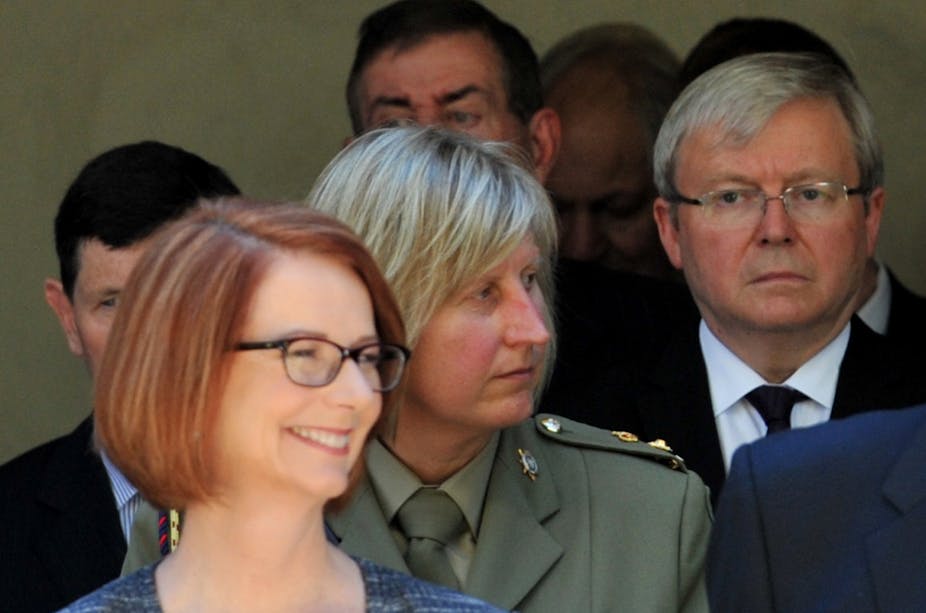If some reports are to be believed, Kevin Rudd will replace Julia Gillard as leader of the ALP and become prime minister again by the end of next week. This raises questions about the political and constitutional implications if such a change was to occur.
On the political front, Rudd’s return would be a Machiavellian triumph. Despite being dumped in 2010, Rudd has never left the forefront of Australian politics. He consistently maintained a high public profile, much to the chagrin of his political opponents within Labor: first as the country’s foreign minister, then as a backbencher after a failed leadership challenge in 2012.
Constantly fuelling Rudd’s prominence in the political debate was the fact that Gillard never established an election-winning lead over the opposition according to opinion polls. Opinion polls showing Rudd to be more popular than Gillard have been a regular feature, precipitating speculation about whether Rudd would one day return to the top job.
An interesting feature of the Rudd-Gillard battle is that it appears to be built on popularity rather than policy. Indeed, those who support Rudd do so because they believe he is more popular with the electorate - suggesting that there is little difference in the leaders’ policy programmes.
Complexities since 2010
Had Labor won a majority in its own right at the last election, a change of leader would not be so complicated. It would be a fairly straightforward process of Gillard leaving the position to Rudd, as Rudd did when Gillard challenged in 2010.
As it stands, Rudd can win the leadership battle of the party but - thanks to Australia’s political system - may not necessarily lead the party to the election as prime minister.
The convention in Australian politics is that the prime minister is the leader of the party (or collection of parties and individual MPs) that holds a majority of seats in the House of Representatives. Furthermore, she or he must be able to pass supply and withstand motions of no confidence.
The problem for Labor now is that it relies on the support of the cross-benchers to remain in government. And there is no guarantee that the cross-benchers will support Labor if Rudd becomes prime minister.
Constitutional considerations
As a result, the governor-general would require Rudd to demonstrate that he had the support of the lower house. Of course, with parliament rising at the end of next week, this could be difficult. But, if Rudd was to win the leadership at the end of next week, the governor-general could recall parliament by using powers outlined in section 5 of the Constitution.
The Rudd-led Labor would then be at the mercy of the cross-benchers. If they support Labor in a no confidence motion, Rudd would gain confirmation of his prime ministership. But if they vote with the opposition, Tony Abbott could be installed as caretaker prime minister until the election was held.
The timing of the election is also fluid, despite Gillard having named September 14 as the date earlier this year. If, in fact, Rudd was to take over, the earliest date a joint House of Representatives and Senate election could be called is August 3. It would be probable that he would go for the earlier date to capitalise on the expected popularity he would enjoy immediately after taking office.
A new Rudd way?
Rudd would also try to distance himself from the Gillard years by breaking links with unpopular policies. For example, he could propose changes to Gillard’s centrepiece policies such as the carbon pricing scheme and school funding reform in an attempt to garner greater support from the electorate.
The relationship between Labor and the Greens, already frosty since Bob Brown’s retirement, would continue to deteriorate under a newly-installed Rudd. He would seek to rebuild Labor’s image as a party that could govern in its own right.
Despite the potential benefits some Labor MPs identify by toppling Gillard, there is a great deal of political danger in reinstalling Rudd. Aside from the constitutional questions, a number of high profile ministers have vowed to never work for Rudd again.
While Rudd could scramble to fill ministerial positions with other MPs, voters may not have enough time to be convinced about the quality or credibility of his new team.
Three years and several leadership challenges later, Labor appears to be unable to move on from the Rudd-Gillard battle. But by potentially fixing a perceived weakness and replacing Gillard, Labor may open up more problems for itself at this late stage of the electoral cycle by reintroducing Rudd as leader.

